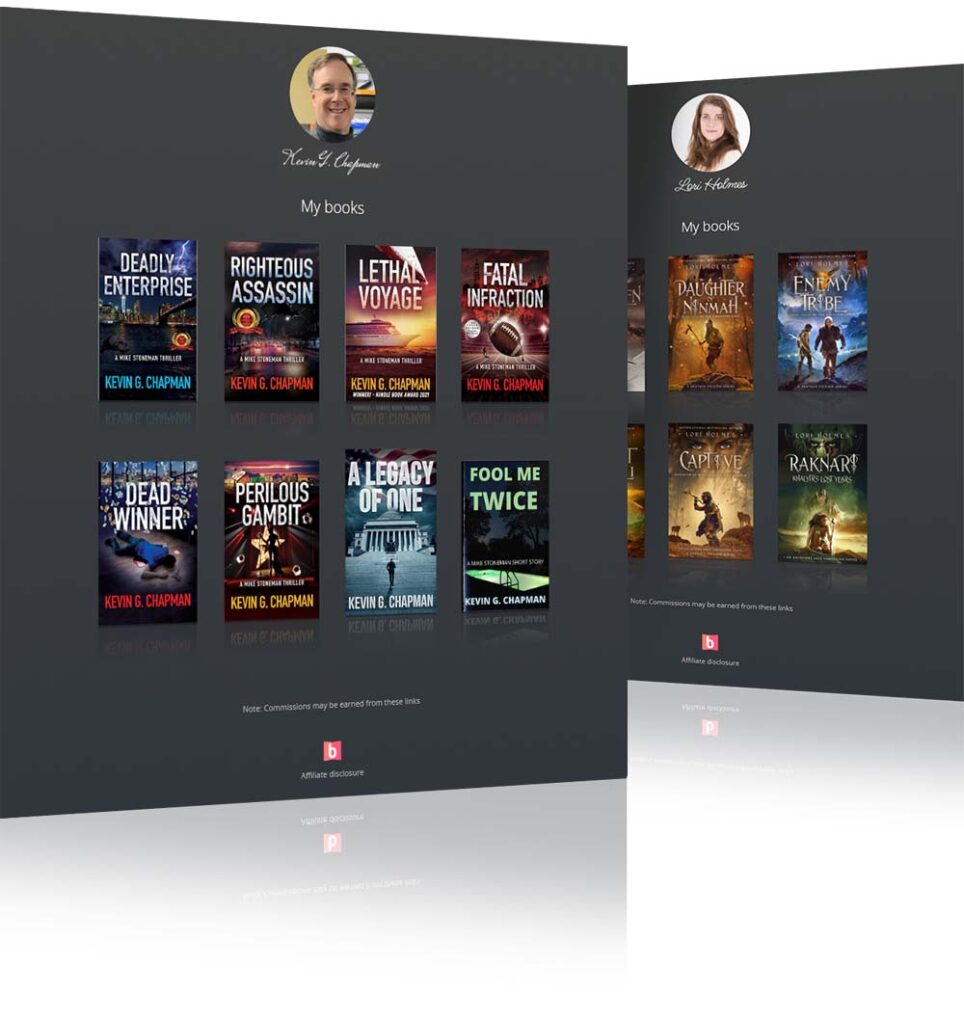
Authors and publishers have always made use of ARCs (advanced reader copies) to build up interest in their books around the time of publishing, to give that all-important social proof, which attracts new readers.
For authors who haven’t utilized ARC copies and readers yet, Booklinker wanted to put together a complete guide on collaborating with ARC Readers.
To do so, we spoke to Jessica Jackson, an author of 5 independently published titles, with nearly 15,000 book sales to date.
Jessica says: “I rely on my ARC readers to ensure each new release has a chance of being seen by new readers amongst the many books in the huge Amazon market, the only marketplace I use.”
Let’s jump into Jessica’s strategies for building an effective ARC team and why authors should consider doing this before releasing a book.

Free Universal Book Links
- Boost international sales by geotargeting readers
- Book store links update automatically based on availability
- Advanced marketing analytics
- Increase clicks with trusted links

Key Takeaways
- Building and Managing an Effective ARC Team: The article emphasizes the importance of creating a team of ARC readers to gain early reviews and social proof, which are crucial for a book’s success.
- The Value of ARC Readers for Authors: ARC readers play a vital role in identifying last-minute errors, providing early feedback, and generating initial reviews that can significantly boost a book’s visibility and credibility.
- Engagement and Community Building: The article highlights the importance of maintaining ongoing communication and engagement with ARC readers.
What is an ARC Reader?
An ARC reader receives a fully edited free book 2-4 weeks before the publishing date, with an expectation of being ready to post a review during launch week, or soon thereafter.
They differ from Beta Readers, who receive their copy prior to this period and who are expected look for errors and inconsistencies in characters, storyline and pacing.
Some ARC readers will point out possible errors they may find, but there is no expectation that readers will proofread , although this will differ from author to author.
ARC readers are not obliged to post a review, though, of course, we want them to! The key is that their review is honest, and therefore helpful to potential new readers.
Why Authors Need ARC Readers
I find ARC readers to be extremely valuable, for many reasons. As writers, particularly brand new writers, a casual browser doesn’t really know much about us or our books.
But when they see many positive book reviews, it makes them take a moment to check out the book , perhaps reading the sample, and using this and the reviews to help them decide whether to go ahead and make a purchase.
It’s human nature to look for social proof; if somebody likes this book, perhaps I will too. Those early reviews start the ball rolling, and new readers may be encouraged to leave a review too. To help with this, I ask them to do so quite directly inside my books.
Writing to raise awareness of child abuse makes me less shy about asking for reviews than I would normally be.
For the last few years, consumers have become accustomed to being asked to review all kinds of products and I personally use reviews to help me with my purchases.
I place a high value on Amazon reviews, and confess that I never look at Goodreads. I didn’t even know what it was until a member of my ARC team for my first book asked me to make sure it was up there, so that she could review it there.I have a few regulars who are awesome at finding typos, and one who is a comma aficionado, which is something I most certainly am not.
Because my books are all on the same subject, my regular ARC team has come to know what to expect, although the details of each case are different. So far, no one has said that a particular story didn’t grab their attention, but they have pointed out when something was confusing.
This is invaluable feedback that helps make my book even stronger. Because I keep my costs down (so that I can donate some of my royalties to child abuse prevention charities) by making my own book covers, not using editors, or in fact any paid-for service, my advance readers perform a great service of getting my books seen and piquing the interest of new readers.

Introducing:
Booklinker Collections
One landing page for all your books. 100% free.
One link for easy sharing of your books across your backmatter, websites, emails, and social media.
How I Built My Team
When I began writing, I planned to and had the idea of self-publishing stories about child abuse, in order to raise awareness, I discovered that my friends could not read my work, as they found it too upsetting.
I knew I had to look elsewhere for readers.
I had joined the mailing lists of three other authors and discovered this mysterious thing called an ARC.
I was thrilled to be accepted as an ARC reader for their books. As I’m good at spotting typos, I found that when I politely pointed out possible mistakes to these authors, they were very grateful, and I built up good relationships that have lasted until the present day.
I eventually plucked up the courage to ask if they would like to offer my free story, via Bookfunnel, to their readers, and when they agreed, I began to build up my mailing list.
My list is still small by many authors’ standards, with less than 1,000 subscribers. I have good engagement, however, with my latest email achieving a 45% open rate.
Perhaps because of my subject – child abuse – I have positive relationships with many of my readers, some of whom suffered abuse as children. This makes it a great experience to invite subscribers to join my ARC Team.
With each release except one, I make use of an ARC team of between 30 and 50 readers. Not everyone will review, however, and if they don’t do so on two occasions, I don’t invite them the next time.
I am a dinosaur and have very little social media interaction and don’t use it to build my team; they all come via my mailing list/newsletter. I have seen fellow authors experiencing both ends of the spectrum with social media.
One author friend was so excited about his Twitter followers who had agreed to be ARC readers for him, but hardly any came through when needed.
Another author I know hosts a ‘problem page’ on Facebook, so she is giving, more than receiving, and her first book has launched to great success, with her FB followers reviewing like there’s no tomorrow!
I believe Booktok is also good for raising authors’ profiles but I’m far too shy to participate.
My newsletter is how I interact with my readers, and I’m getting better at thinking up what to say!
I always add a link to a song choice connected with the newsletter content, and readers began suggesting their own, so I’ve now opened it up to everyone, and am compiling a list of songs that I’ll include in each new newsletter.
I believe that things like this increase interest and engagement, so should I invite them to join the ARC team in the future, they may be motivated to do so.
I choose ARC readers by keeping track of emails we’ve exchanged, to see how engaged they feel with my writing. I accept that not everyone will review every book, especially if they’re avid readers and have many calls upon them to review.
One of my biggest compliments was from a man who is dyslexic and had never completed a book in his life, until he read my first book from cover to cover.
When some readers review under a name with no connection to their actual name or email address, it isn’t always possible to know who is doing an awesome job reviewing my books, and it means I can’t invite them to the team. But when it’s obvious, I will make a point of inviting someone who has reviewed two of my books.
At the beginning, a handful of readers asked to join my team, as they were experienced in doing this for other authors. Now I have a core team, and other members change for each release. I recruit my team for each release, asking if they want to join, even those who have been with me since book one.
How Should Authors Organize and Manage Their Team

I keep a spreadsheet for each book and check if the reader has reviewed it or not. I send new members an overview of what being an ARC reader entails and ask for their reviewer name. I also make a note of their record in my subscriber database.
I let them know that some ARC readers make notes on the book as they read, but this is not expected. I invite feedback during the pre-release period and appreciate it when readers take the time to do this. I also remind them that receiving the free book is not in return for a review, as this is against Amazon’s TOCs. But I make sure they know how much their review will be appreciated.
Tip!
- I send review links (which I make in Geniuslink) to my ARC readers on publishing day.
As I mentioned above, I use Bookfunnel to distribute free ebooks. As this is how they joined my subscriber list in the first place (by downloading a free ebook from Bookfunnel), this usually goes fairly smoothly. I like Bookfunnel’s email helpline too. Readers give me direct feedback by email if they wish to, and make corrections where necessary.
What do ARC Readers Get Out of it?
Tip!
- My ARC readers like the feeling of being the first to read a new book and being part of the process of creating the product that they will soon see in the Amazon store.
As I only publish a book about twice a year, I am lucky in that some readers are eagerly awaiting the next release.
In my email newsletter in the run-up to publishing, I mention one or two of the children I am writing about, and show the cover, sometimes asking readers’ opinions, as I like them to feel involved.
This is for all subscribers, not just ARC readers. I encourage all my readers to get in touch by email at any time and invite them to suggest new cases for me to cover.
Some ARC readers are very motivated to give feedback. They enjoy feeling part of a team and being instrumental to the success of the book. New members tell me it’s an honor to have the opportunity to be there at the beginning. I feel the same when I am an ARC myself for other authors.
Best Practices for Both Parties
By having email dialogue with the reader in the run-up to sending out the ARCs, I can evaluate how engaged they are, and encourage communication. But I also feel that good communication is a year-round thing.
Generally, I only email around once every three weeks, and I keep the emails fairly short. If I ask questions, I make it easy to give responses by including click boxes that send emails back to me.
A particular issue for me is that many of my subscribers are readers of books by prolific authors, on whose mailing list I am also a subscriber, so I know when these authors have a new book coming out. I try to work around my fellow authors’ publishing dates so that readers are not bombarded all at once.
I always stress that the review should be honest. All 5-star reviews can look a little fake anyway, so I’m happy with a variety of star ratings. It’s no use to a new reader to be told a book is beautifully written, only to find it’s full of errors. In their disappointment, they may then write a particularly damning review themselves.
Honesty is the best policy.
Perhaps just a personal thing, but I tend to ignore reviews by review organizations, as I know the writer has paid for the service. I empathize if they have to do this, but some of these reviews seem like an excuse for the reviewer to showcase their own literary talents, rather than giving meaningful comments.
Similarly, I stress to my ARC readers that I do not expect/demand lengthy reviews. I have one or two reviewers who do write long passages, however, and this is fine. I don’t want to influence how they review to such an extent. If they like to write long reviews, who am I to argue? It’s their review after all.
Deadlines: Importance of Adhering to Schedules
As I’m a perfectionist, I know that having a strict deadline for sending out the ARC copies won’t work for me; I need the book to be as good as it can be before doing so, and I will work on it until I get to that stage. For this reason, I don’t set a firm date in the future, either for ARCs to be sent out or for publishing.
I never put my books on pre-order, as I put myself under enough pressure without having that hanging over my head, and I don’t find it necessary. But I do keep in touch and whet the reader’s appetite with information about the book.
My ARC readers range from those who review on release day to those who don’t do so until up to two weeks later. I’m happy with that.
Occasionally, reviews aren’t posted at all, as I have discovered when reviewing other books myself. With my first book, some early reviews were never published, as Amazon is suspicious of a slew of reviews for a first book by a brand-new author.
Case Studies: Real-world Examples of Successful ARC Campaigns
All of my launches but one have been with the support of ARC readers. The one without an ARC team launched very quietly and had less than 10 reviews when I unpublished it (for a number of reasons), a few weeks later.
Thinking back to my first launch, in April 2021, I had a mailing list of around 200-300 members, some of whom were very communicative and supportive. They had already read two free ebooks, and knowing that I was a brand new author, several were generous in their support of my writing, and had given me feedback.
Along with around six readers who asked if they could receive an ARC copy, I invited 25 more to join the team. It felt (and still does feel) very much like we were in it together, with a joint purpose to raise awareness of this taboo subject of child abuse.
Sending out ARC copies can be stressful, as until that point, it’s hard to tell if the book will appeal to readers, and I remember feeling quite anxious. During the advance reading period, I asked for feedback, and the majority were happy to give it, and it put my mind at rest.
I can expect around 30 reviews within the first 2 weeks. (Perhaps more, I can’t remember!)

Introducing:
Booklinker Collections
One landing page for all your books. 100% free.
One link for easy sharing of your books across your backmatter, websites, emails, and social media.
Conclusion
There are numerous benefits to both readers and authors in having an ARC team. There’s excitement when a new book by a favorite author is on the horizon, and readers love to feel part of the process of publishing a book.
They love to receive a copy before other readers do, having input to the content, and they enjoy the interaction with the author. Along with the feeling of being part of a team, they like to know they have contributed to the success of a new book.
As an author, ARC readers are priceless. They can spot last-minute typos, plot holes, the wrong name being used, etc. By reviewing during the period that Amazon gives high visibility to new books, they greatly add to the overall promotion to browsers seeking books in that genre.
I highly recommend using an ARC team, and rather than focusing on the fact that they’re receiving a free book, I focus on their being part of its success.
As I choose members wisely, I feel reasonably confident now that many of them will come through with a review. I also mention that if they decide to buy the book when published (at a low price to subscribers for the first week) their review will be Verified, and therefore shown across all marketplaces, e.g. UK, US, Canada, Australia, not just the one the reviewer comes from.
Some do this, and I’m very grateful, but it’s by no means an expectation.
For anyone who feels unsure about using ARC readers, I’d say: Go for it. Be respectful, but don’t feel you’re asking a huge favor of them; instead, you’re giving them an opportunity to be part of something awesome!
Author
-
I'm a UK author, though many of my readers are from the US, and it’s a thrill to be communicating with people throughout the world from my little office in the north of England. I’ve worked as a tutor and support worker for disadvantaged women, counselling them through tough times as parents. I also spent many years as a mental health advocate for a leading UK charity. I began writing after discovering how many children are abused by their parents or caregivers.



